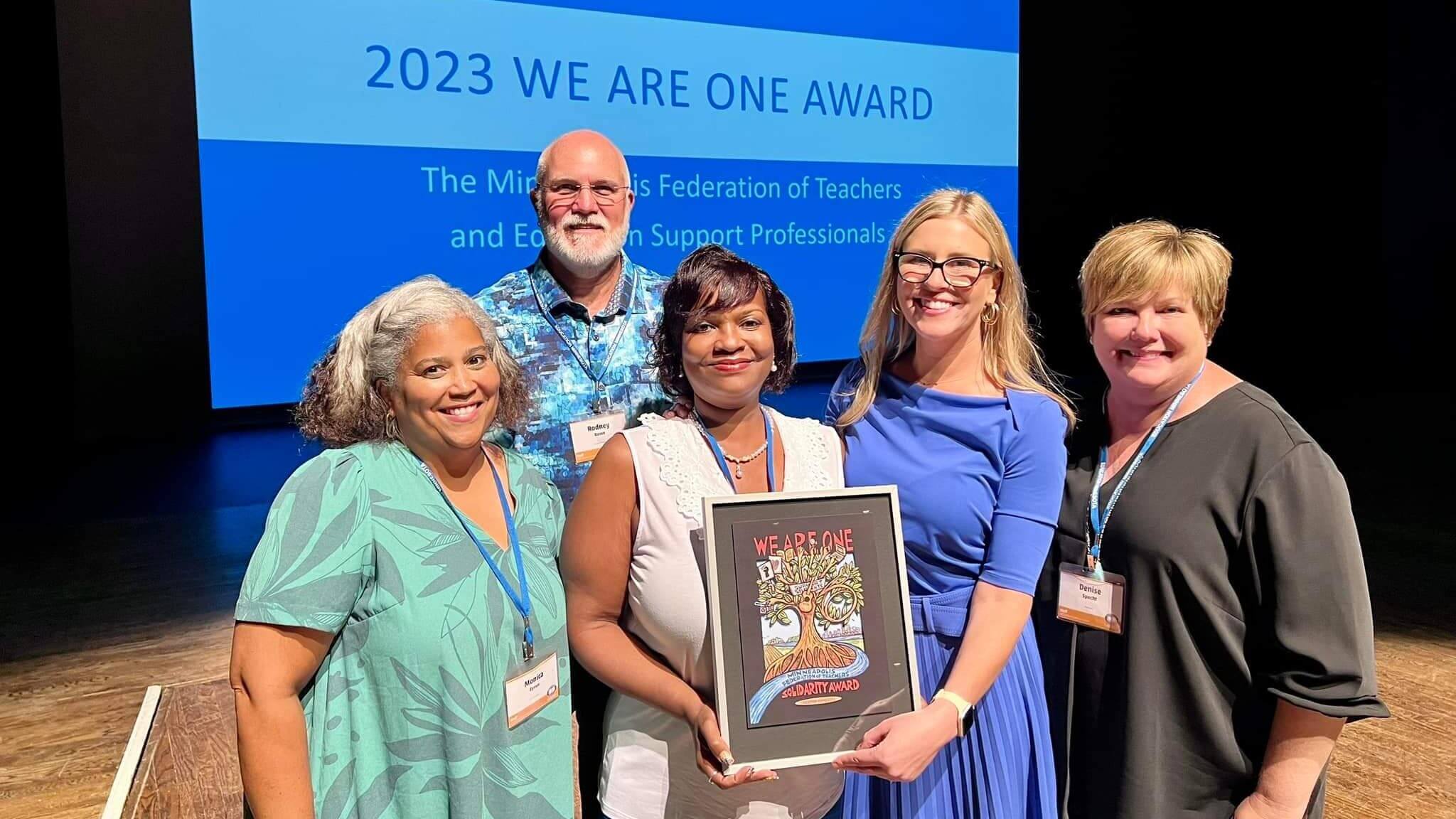
The Minneapolis Federation of Teachers and Education Support Professionals were honored this year for the unity they showed during their 2022 strike with the We Are One Solidarity Award.
The We Are One Solidarity Award is given annually to an Education Minnesota local union or active member demonstrating outstanding or significant leadership in any of the following ways:
- Developing and implementing an organizing campaign.
- Expanding relationships with other unions and the AFL-CIO.
- Developing and implementing a member engagement campaign.
- Working collectively for the common good.
- Protecting or advocating for workers’ rights.
- Extending the benefits of a union by organizing the unorganized.
“The conditions were such that we had no other choice but to do what was best for our students,” said MFT Teacher Chapter President Greta Callahan, reflecting on the strike. “And after trying every other option that existed, we knew, and when I say we, I mean 5,000 of us strong knew that was the action we had to take in order to give them the schools they deserved.”
The MFT teacher and ESP chapters were on strike for a total of 14 days in March 2022.
The 2021-23 contract that came out of that action included significant wage increases for ESPs and nation-leading protections for teachers from underrepresented communities, including exemptions from the excess and layoff process and more. In addition to improving students’ learning conditions by adding more counselors, social workers, nurses and specialists, this strike also helped set the conditions for significant change within MPS and how it approaches its work.
The increase in pay for ESPs – the cornerstone ask in negotiations for both units – included hourly pay raises from $1.92 an hour over two years to $6.98 an hour over two years.
“I personally heard from teachers that said, I am on the line for my ESPs and I’m out here so that you guys can get paid a decent, livable wage,” said MFT ESP Chapter President Catina Taylor.
While the two chapters have two separate contracts, MFT knew they would be stronger together and that the fight for ESPs would in turn help support the teacher chapter members as well.
“It has allowed an openness between chapters,” said Marcia Howard, MFT teacher chapter first vice president, currently serving as acting president. “We’re actually attempting to go beyond where we were before.”
Both units saw membership rise in anticipation of the strike. The ESP chapter saw more than 200 new members sign up so they could participate in the vote and strike.
“This is a statement from thousands and thousands of educators supporting over 30,000 students that it doesn’t have to be this way, and we’re going to do something about it,” said Callahan, the night of the vote announcement.
The unions have now seen activism and involvement increase in the year since the strike.
“We have people working here all summer doing this,” said Callahan. “We have more stewards than every before. We have a 45-person bargaining team. People are activated and they see the power of collective action.”
The solidarity built in the union before, during and after the strike has also had an impact on labor around the state. MFT has also supported other workers taking collective action or going on strike in the time since they were out on the line, continuing to raise awareness of the labor movement in the Twin Cities.
“Taking a stand to help push our education system to be better, it’s not an easy path,” said Greg Nammacher, a Minneapolis parent and SEIU Local 26 president. “That strike, it didn’t solve every dynamic that is out there. But it did plant a flag that teachers and parents together, when they are in motion, are the only force that can actually start to fix some of these dynamics.”
Callahan says that while every union doesn’t need to go on strike, every union should be ready if they need to in the future. “It is one of the most important tools we have as labor to use,” she said. “It is the reason why you have a prep. It is the reason why you have a lunch. It is the reason why we have all of the laws we do, because people took that action to withhold their work at some point. It is one of the most important tools that we have as a union, and we are so lucky to live in a state where we can do it legally. It is imperative that you flex that muscle and, if nothing else, that you are ready to do it if you have to, because otherwise, we will continue with the dismantling of public education. And our students are the ones who suffer, which in turn our entire state suffers.”


